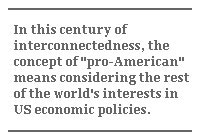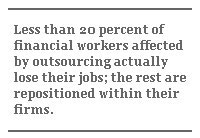US Presidential Campaigns and the World – Part I
US Presidential Campaigns and the World – Part I

SPOKANE, WASHINGTON: As the American electoral campaign reaches fever pitch, opinion polls show President George W. Bush and his Democratic opponent John Kerry in a dead heat. But the campaigns may have already claimed a victim: the notion of free trade. Their approach is summed up in a billboard in South Carolina which asked voters, "Lost your job to free trade or offshore outsourcing yet?"
George W. Bush and John Kerry have taken plenty of verbal shots at each other, but they have joined forces to thrash global commerce. Kerry has built his campaign on early opposition to outsourcing, and not to be outdone, President Bush joined the anti-outsourcing chorus: "There are people looking for work because jobs have gone overseas. … We need to act to make sure there are more jobs at home and people are more likely to retain a job."

Short sound-bite attacks on outsourcing, the World Trade Organization, and the United Nations play well to crowds, but betray a simplistic and inaccurate view of the newly globalized world. The United States needs a clear strategic plan for marshalling global commerce to increase peace and prosperity at home and abroad. Unfortunately, in today's highly charged political culture, simplistic protectionist slogans and nationalistic bromides suggest one can deter the forces of globalization – a prospect about as likely as stopping the sun from rising in the east. In this century of interconnectedness, the concept of "pro-American" means considering the rest of the world's interests in US economic policies.
It's too facile to blame America's ills on outsourcing, skewed tax codes, weak multilateral organizations, and global culture wars. For example, recent empirical studies show that outsourcing is neither the economic panacea promised by the economic theories espoused by Adam Smith and David Ricardo, nor is it the disaster feared by American isolationists.
Outsourcing, like globalization, is a pervasive economic reality. These forces cannot be stopped, but they can be managed to maximize benefits while reducing undesirable consequences. Sound policy decisions require a robust dialogue based on research and actual evidence. Yet, political leaders and election strategists seem intent on telling voters that outsourcing is a zero-sum game, with losses accumulating only to the United States.

Outsourcing affects only a tiny portion of employed Americans. One study shows that while over 90 percent of all US businesses outsource some work (usually domestically), only about .2 percent of jobs have been lost in the last 3 years to international outsourcing. Boston University Professor Nitin Joglekar found that less than 20 percent of financial workers affected by outsourcing actually lose their jobs; the rest are repositioned within their firms. IBM came under public fire for outsourcing 3,000 IT jobs; critics failed to mention that IBM plans to add 4,500 positions to US payrolls. Both Microsoft and Oracle have simultaneously increased outsourcing and domestic jobs.
Often overlooked are jobs outsourced by foreign firms to the United States. Foreign entities have created over 6.5 million jobs for US workers. These “insourced” jobs, according to the US Bureau of Labor Statistics, are growing at a faster rate than internationally outsourced US jobs.
Americans must look beyond their own borders to see their country not as an isolated entity, but as a player reliant on the global economy. Outsourcing to India and China provides jobs in those countries; that, in turn, contributes economic and political stability that greatly benefits both America and the world. A recent McKinsey Global Institute report estimates that for every dollar spent on foreign outsourcing to India, the United States receives at least US$1.12 in benefits.

The real culprit in US job-creation malaise is not offshore outsourcing, but productivity due largely to labor-saving automation – but no presidential candidate wants to condemn productivity growth. Its benefits are numerous: Lower costs yield higher profits, and often lower prices mute inflation. This decreases interest rates, thereby increasing investment and growth. Productivity generates wealth and employment, but not always in equal measures. Economists estimate that one percentage point of productivity growth can eliminate up to 1.3 million jobs a year. Catherine L. Mann of the Institute for International Economics determined that outsourcing boosted productivity growth from 2.5 percent to 2.8 percent a year from 1995 to 2002, and added over US$230 billion to total US output of goods and services.
These statistics are nonetheless cold comfort to those who have lost their jobs to overseas labor markets. Outsourcing's benefits are diffused and unevenly distributed to those whose jobs are lost. US candidates should focus on programs that position displaced workers in new careers that will directly benefit from the global economy. This calls for creative approaches to relieving employee anxiety over job exports. Only a holistic examination of the issue will reveal the true costs, benefits, threats, and opportunities of outsourcing and globalization.
A similar approach is necessary to evaluate protective tariffs and the WTO. The spectacular failure of last year's global trade negotiations in Cancún, Mexico, demonstrates the growing divide between the developing and developed world, a troubling fact that has been virtually ignored by both presidential candidates.

It is not in anyone's best long-term interests to slap tariffs on foreign steel or to increase tax breaks for American cotton farmers. The Institute for International Economics estimates that 45,000 to 75,000 jobs were lost when higher prices rendered US steel-using industries less competitive. Nor is it in anyone's interests to subsidize cattle producers at US$2.50 daily per cow, while 40 percent of the world tries to survive on less than US$2 a person per day. Rather than resist WTO efforts to reduce international trade inequities, the United States and the EU should develop policies that not only ensure fair competition globally, but also increase protection against gross labor abuses, unconscionable environmental damage, and misappropriated foreign-investment ventures.
Ultimately, the candidates are implicitly bandying about protectionism, pure and simple. While scapegoating foreigners may be smart politics, protectionism is a recipe for long-term decline. Trade protectionism leads to higher prices for consumers and lower rates of return for investors. While preserving jobs in less competitive sectors, it actually destroys future jobs in more competitive emerging sectors.
Globalization has its upsides and downsides, but countries with the right framework of institutions and governance can get the best out of it and cushion the worst. Correctly managed outsourcing and US subsidy and tariff reduction will help the rest of the world work its way into wealth. That is in everyone's interests, and it is not a zero-sum game.
As the election season heats up, the American electorate should press both presidential nominees, as well as candidates for Congress, to face the reality of the global marketplace. They should demand informed and real solutions to the challenges of international trade and diplomacy, rather than accepting the pandering rhetoric of shortsighted politics.
Former Secretary of State Warren Christopher once said "distance and differences have blinded [us] to our common hopes and interests, creating distorted images of each other that drive us apart." However, management guru Peter Drucker has argued that the revolutions of the internet has eliminated distance, providing one inseparable globalized, political economy.
Who is more prophetic? It depends on the candidates' deliberations over the next few weeks – and the decisions they make after they're elected. The world is watching.
Kyle Usrey is dean of the School of Global Commerce and Management at Whitworth College in Spokane, Washington.